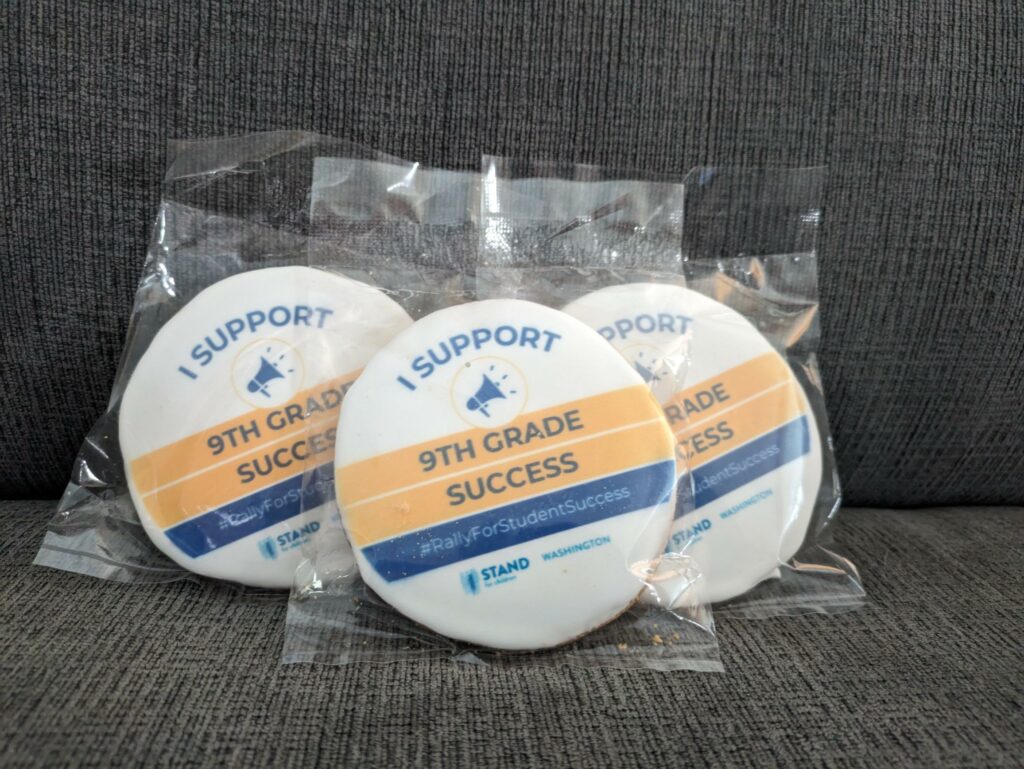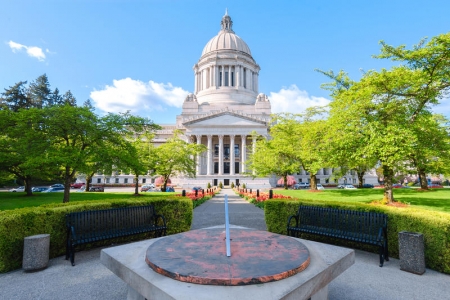We did not let a short 60-day session shrink our ambition for system changes that will benefit young people in Washington.
2024 Legislative Session Stats:
- 46 community voices testified
- $8.5m allocated to remove barriers and support students
- 76,800 Students impacted
- 150 Cookies shared (Making change one cookie at a time!)

We set out with clear goals to advance ninth grade success and eliminate outlawed debt, while supporting partner priorities to advance racial justice and proven solutions that benefit kids. These goals resonated with legislators, activists, advocates, and community members who shared their voice this session in support of these and other critical priorities. Thanks to their voices and advocacy, the legislature passed SB 5974 and allocated $3M in the final budget for the Ninth Grade Success Initiative.
But despite the short session, we must keep a long memory – many important priorities were kicked down the road to next year, “when there’s more time.” We were disappointed to see some very innovative policies that would have made a difference in young peoples’ lives stall out. These policies include a number of youth justice proposals that would have acknowledged the science of brain development, and the harm done by past policies that were rooted in hyper-punitive, counterproductive narratives about young people. This article highlights why the instinct to build up punitive systems is harmful and unproductive if we truly intend to rehabilitate. Legislators also missed opportunities to put into law the state’s commitment to students at critical junctures, by not passing bills like Ninth Grade Success Initiative (SB 5408/HB 2053) or a bill to provide supports for chronically absent students and students with other barriers (SB 5850).
As we wrap up this session, we are taking away key lessons for our collective work:
- Now is the time to start organizing to hold each other and our lawmakers accountable for priorities deferred to the 2025 legislative session. At Stand, we do this in multiple ways: through our PAC’s endorsement process, through interim meetings and conversations, and by connecting those closest to an issue with the lawmakers making decisions about it.
- Working in partnership and coalition is vital and helps us have stronger wins and to weather the disappointments. Our partners in this work challenge and inspire us daily to keep fighting for what is right and what will work to support students. We must be crystal clear in our demands for youth justice to ensure young people stay out of the juvenile rehabilitation and criminal legal systems and stay in rigorous and enriching educational environments, and there is a lot of work to do to cut through the political rhetoric and educate lawmakers about what truly works to support young people.
- Our Debt Free Youth Justice coalition brought together more than 20 organizations, and dozens of directly impacted young people, to reduce the harmful impacts of the juvenile legal system.
- Our High School Success Coalition collaborated on bills to support every student on their path to achieving a rigorous high school diploma and pursuing their dreams.
- We must make room for connection and healing. This work is hard, and isolating. The antidote is community connection. We will be looking for opportunities to connect with you throughout interim, virtually and in community.
As a first step towards that connection, we want to hear from you! Please stay in touch and let us know what you are interested in connecting on, and issues that are arising in your community.
In closing, our work is not possible without your partnership. Thank you for standing with us, and standing with children, this legislative session and always.
In partnership,
Kia & Liz















